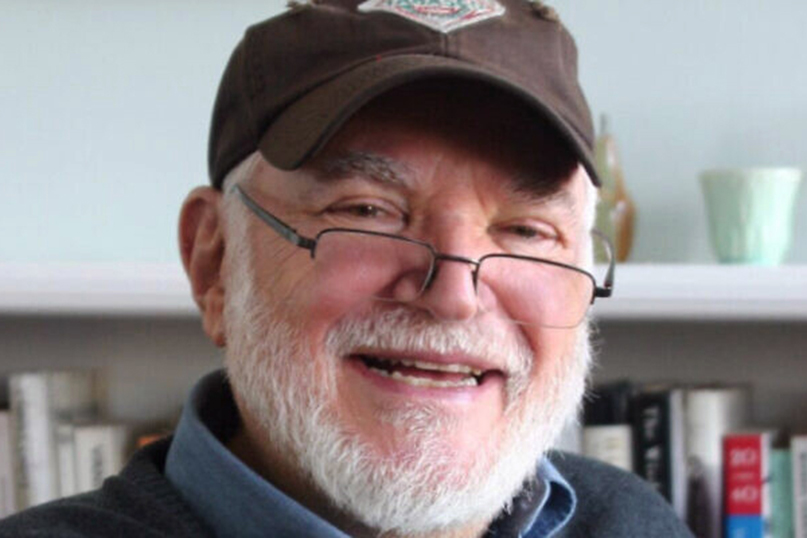
By Shira Hanau
(JTA) – Nach Waxman, owner of the beloved New York City cookbook store Kitchen Arts & Letters, as well as a maven of both Jewish cooking and Jewish texts, has died. He was 84.
“He built the store into a worldwide haven for people who were serious about food and drink books,” the read an announcement issued by his Upper East Side shop. “He encouraged the best authors, respected the passion and curiosity of cooks and readers at all levels, and never lost a sense of pleasure and wonder at discovering the myriad ways people wrote about cooking, eating, and drinking. All of us who worked with him will miss him deeply.”
Waxman was a mainstay of a small group of friends who met every Sunday morning for more than 25 years at his Upper West Side apartment to study Jewish texts.
As much as he loved studying Torah, Waxman was equally devoted to traditional Jewish foods, especially schmaltz and liver, and kept a collection of his own Jewish cookbooks in the back of his store.
Joan Nathan, the Jewish food writer and author of multiple Jewish cookbooks, said Waxman helped her find Yemenite and Sephardic cookbooks – often synagogue and community cookbooks from all over the United States – before those styles of cooking became popular among Ashkenazi cooks.
“We clicked right away, and clicked over brisket because he really liked brisket,” said Nathan, who first became friends with Waxman in the 1980s.
Waxman grew up in Vineland, New Jersey, a town that was once home to a community of Jewish farmers. He attended a Jewish day school in Philadelphia, which meant traveling by train early each morning and returning home late in the evening. Still, he fell in love with Judaism.
After college he began studying for a doctorate in anthropology but moved into the publishing industry and worked as an editor. His love of literature extended to the Bible.
The Sunday morning study group originally began with a few parents who met at the Stephen Wise Temple while their children attended Hebrew school. The meetings eventually moved to the Waxmans’ apartment, where the group would usually nosh on bagels and lox while they studied. On holidays, however, Waxman would prepare a special breakfast like latkes for Chanukah and matzah brei for Passover.
“They have a total love of study, they had a great intellectual curiosity and a sense of wow isn’t that amazing,” said Rabbi Jeremy Kalmanofsky of Congregation Ansche Chesed, where Waxman and his wife, Maron, were members.
Kalmanofsky said the Waxmans arrived exactly on time for services each Saturday morning and stayed through the end. Waxman’s son, Joshua, is a Reconstructionist rabbi in New Jersey and has taught at the same school his father attended as a child. The Waxmans also have a daughter, Sarah, and several grandchildren.
Leah Koenig, a food writer and author of several Jewish cookbooks, met Waxman when she found his recipe for russel, a fermented beet broth made by Russian Jews to add to borscht, in an Anshe Chesed community cookbook. She visited Waxman at his home in 2019 to learn how he made the broth in his mother’s old ceramic crock used exclusively for that purpose each spring in preparation for Passover.
“Growing up, we kept the crock in a special cabinet in our cellar where the Passover dishes were stored,” Waxman told Koenig. “It was something you waited for. There was real excitement when the crock came out and the beets were done.”
Waxman described russel in the Anshe Chesed cookbook as the dish that “heralded, as clearly as a shofar blast, that change was on the way –that we were beginning the countdown to Pesach,” according to Koenig.
“I think he’s somebody who understood the importance of cookbooks as literature and understood the importance of food books to telling cultural stories,” Koenig told JTA.
But the Jewish recipe Waxman will be best known for is his brisket. The onion-heavy recipe – developed as a hybrid of his mother and mother-in-law’s techniques – was first published in the 1989 New Basics Cookbook.
Waxman’s study group did not meet during the shiva period and group member Rita Falbel, a friend of Waxman, said she didn’t know when the group would get together next, but she knew Waxman would be sorely missed.
Struggling to fully describe her friend, Falbel asked: “How can I describe somebody who loved life in all its forms?”
Main Photo: Nach Waxman was devoted to traditional Jewish foods, especially schmaltz and liver, and kept a collection of his own Jewish cookbooks in the back of his store. (Kitchen Arts & Letters)








 Southern New England Jewish Ledger
Southern New England Jewish Ledger










